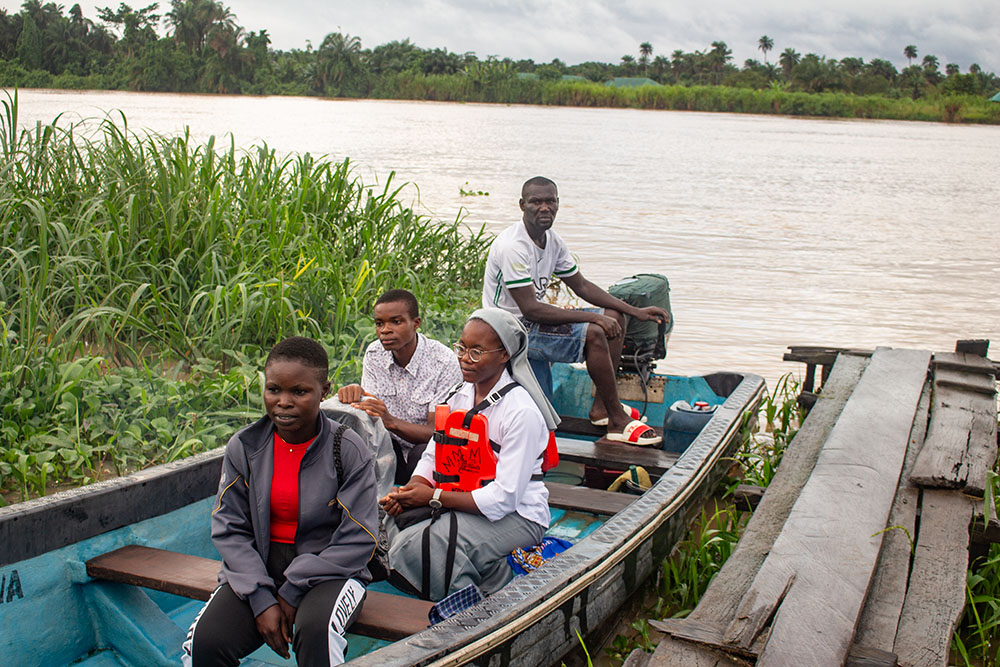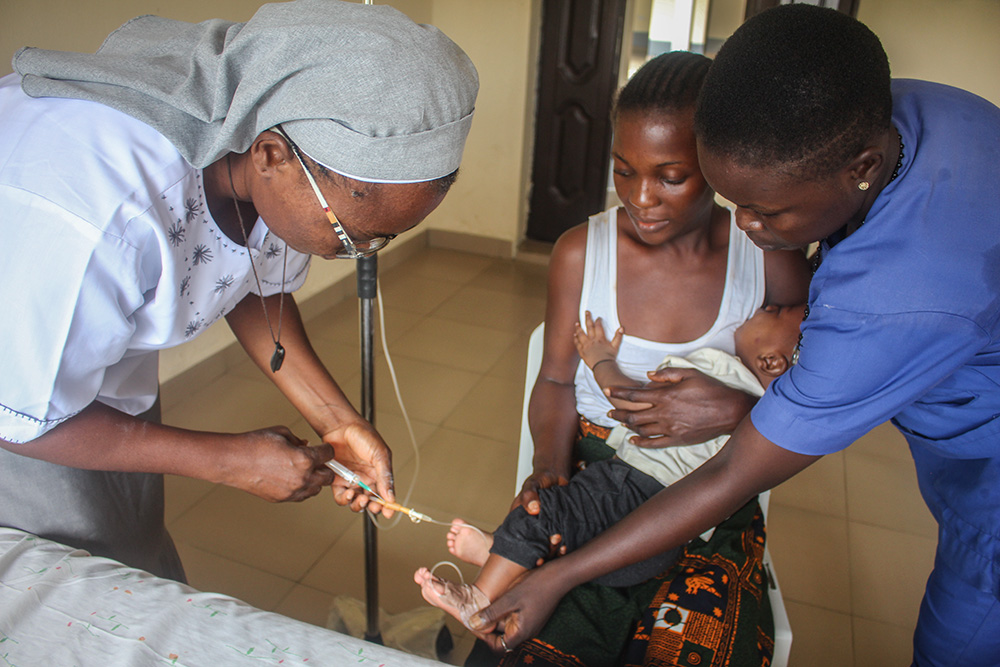
Medical Missionaries of Mary Sr. Janefrances Ihekuna and her team return to a local jetty after their weekly awareness campaign in Fou-Torugbene, a community located 30 minutes by boat from Torugbene, Nigeria, where Ihekuna is administrator for Mary Martin Primary Health Center. They also take health care services to other communities like BlouTamigbe, Isrealiozion, and Akwaware quarter once a month at a subsidized rate. (GSR photo/Valentine Benjamin)
Sisters of the Medical Missionaries of Mary are braving the odds in Torugbene community, in the Bomadi Diocese in Nigeria's oil-rich Delta State.
Torugbene, home to the Ijaw-speaking tribe who are predominantly farmers and fishermen, is located a few miles inland from the Gulf of Guinea near the convergence of the Niger River, which often leads to seasonal flooding. The floods sweep through homes and destroy farmlands, grinding the rural lifestyle to a halt.
The community faces significant challenges due to limited resources and a lack of government presence, resulting in inadequate housing, motorable roads, employment, electricity, education, health care and access to clean drinking water.
"It's a dire situation that leaves our people here exposed to all kinds of diseases," said Sr. Janefrances Ihekuna, administrator for Mary Martin Primary Health Center, Torugbene.
"We live and work in a riverine community surrounded by water that is often polluted and consumed by the people; they bathe and dispose of their waste in it. They also drink and cook with this water. Unfortunately, it is causing harm to them."
Earlier this year, Nigeria experienced a surge in the outbreak of cholera, a disease that is transmitted through food or water contaminated with fecal material from an infected person and in unhygienic environments. The country's Center for Disease Control declared it a "national emergency," adding to the challenges faced by the already fragile health care system.
Advertisement
Experts attribute the water scarcity in most Nigerian states to be the main cause. Torugbene, where the sisters work, lacks pipe-bore water; residents drink from the stream. They also practice open defecation — a major contributor to disease transmission — due to lack of access to proper sanitation facilities.
Approximately 48 million Nigerians engage in open defecation, and only 8% of the population practice clean hand-washing, according to a 2021 WASH NORM report. Nearly 70 million Nigerians lack access to safe drinking water, leading to around 70,000 deaths in children under 5 from diarrheal diseases annually, according to the World Bank.
The sisters also work in Foutorugbene, a community located 30 minutes by boat from Torugbene. These communities often face flooding due to their location on the lagoon, which connects to the Niger River.
"We visit Foutorugbene weekly to sensitize the people on proper hygiene like purifying the water they drink and use for cooking, regular hand-washing with soap and water after using the toilet, maintaining their body cleanliness, and use of sanitary towels for women and girls," Ihekuna said.
"Our campaigns and health care services are also extended to [the communities of] BlouTamigbe, Isrealiozion and Akwaware once a month at a subsidized rate. Free HIV screening is also offered, and the test kits are provided by our partnering clinic Our Lady of the Waters."
The group also cares for individuals suffering from waterborne diseases such as cholera, diarrhea, dysentery, hepatitis A, typhoid and polio.

Medical Missionaries of Mary Sr. Helen Omeya, acting matron at the Mary Martin Primary Health Center in Torugbene, Nigeria, administers a treatment for dysentery to a 5-month-old baby. (GSR photo/Valentine Benjamin)
Ihekuna says people in Torugbene have experienced a series of cases of intestinal diseases, and the outbreak of cholera in parts of the country earlier this year could have devastating effects on the people, as their main source of water is the same river where they carry out all their activities.
"Our people do not prioritize seeking health care services, such as going to the hospital. They believe more in traditional healing," Ihekuna said. "Almost every family has a chemist shop, and they also use herbal medicine, such as concoctions. They prefer massage over other forms of treatment."
"We also raise awareness for them because it causes more harm than good. Often, they come to us when the situation has become uncontrollable and complicated, requiring our intervention. Sometimes, the person might end up dying."
Ihekuna works with Sr. Helen Omeya, who is acting matron at the Mary Martin Primary Health Center, which provides antenatal care for pregnant women and immunizes babies for polio. The center also educates women on the dangers of seeking pregnancy care from traditional birth attendants, especially during emergencies like cesarean section, postpartum hemorrhage, preterm labor and preeclampsia.
The awareness also includes educating young girls about avoiding teenage pregnancy and harmful traditional practices promoted by their parents, which influence them to conceive out of wedlock and give birth at home.
The group also runs a program called Youth Forum, where they aim to help youth understand the importance of healthy living beyond early parenthood.





